
Of tariffs and tensions: SCF for resilient supply chains
Of Tariffs and Tensions: Is SCF the Backbone of Resilient Supply Chains?
As global trade grows more unpredictable—fueled by tariffs, shifting policies, and geopolitical tensions—one question takes center stage: Can supply chain finance (SCF) deliver the resilience companies need?
This panel brings together voices from banks, manufacturers, and credit institutions to explore whether SCF is evolving into a true shock absorber—or whether it’s under strain itself. We’ll examine how SCF helps firms manage risk, maintain liquidity, and keep supply chains moving when trust is fragile and cash flow is under pressure.
Are we seeing a transformation in how SCF is used, or are current strategies still tied to legacy models? How do trade policies shape financing decisions, and what happens when the assumptions behind them no longer hold?
If you’re navigating the realities of global supply chains, this session offers a grounded, practice-oriented look at whether SCF is part of the solution—or facing a resilience test of its own.
Previously, this event has attracted over 150 participants, including managers, executives, SCF providers, researchers, and students. Register now to join our discussion!
INVITED EXPERTS
INVITED EXPERTS
YOUR HOST















Online Event on July 3, 2025
You will receive the access data to our online event 1 week before the Supply Chain Finance Hub takes place.

“At our SCF Hubs, we learn together in a diverse group of leading experts about challenges and opportunities in Supply Chain Finance. Join us to be a part of this collaborative knowledge-sharing experience.”
The sixth SCF Hub took place on 4 December 2024.
The fifth SCF Hub took place from 5 December 2023 to 7 December 2023.
The forth SCF Hub took place from 25 October 2022 to 27 October 2022.
The third SCF Hub took place from 26 October 2021 to 28 October 2021.

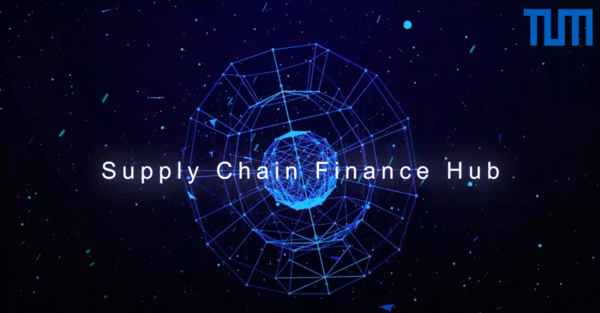
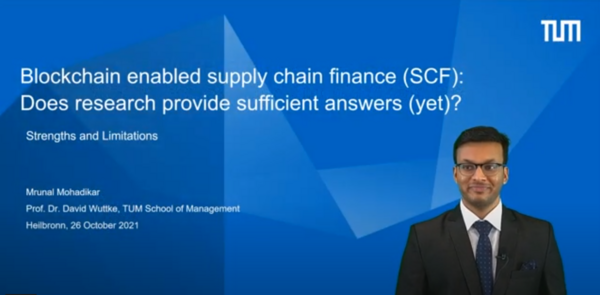
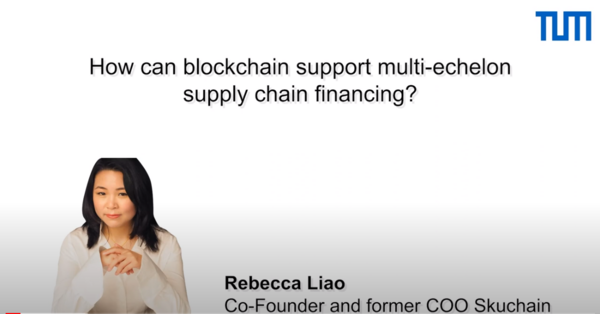
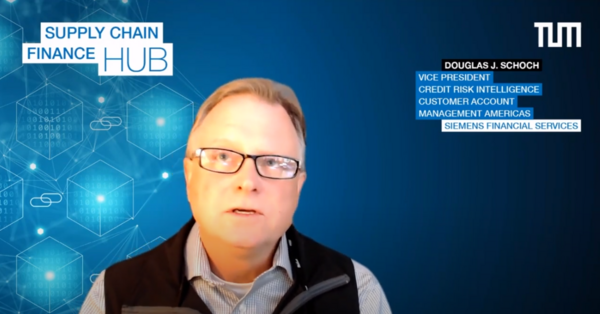
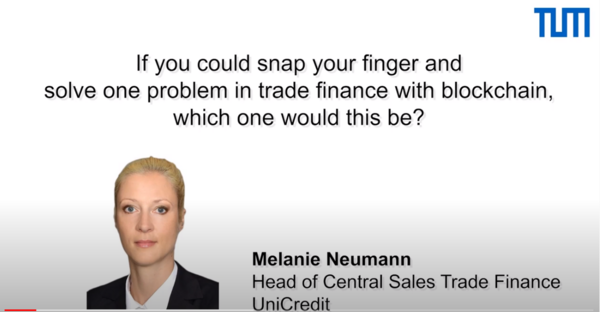
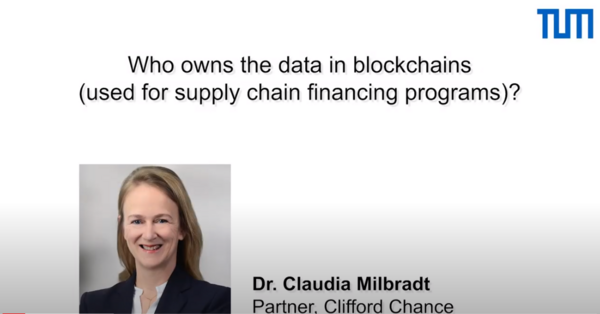


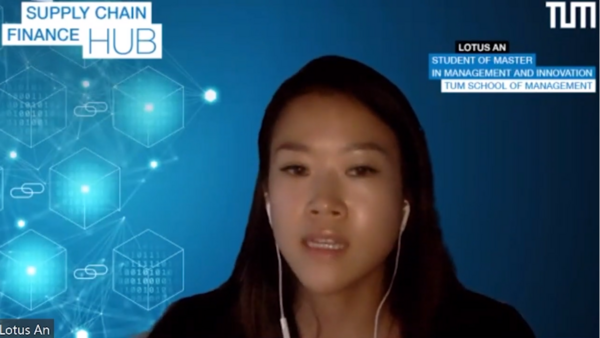
The second SCF Hub took place from 19 May 2021 to 21 May 2021.
The first SCF Hub took place on 16 November 2020.

Experts from various industries explored how artificial intelligence is revolutionizing financing processes along the supply chain. The event featured representatives from bank, manufacturing firms, financial and credit institutions. Together, we discussed whether AI in supply chain finance is still just a concept or already a reality and whether it opens up entirely new opportunities or primarily enhances existing workflows. We also explored how AI impacts risk assessment and credit decisions, and how it affects transparency and trust among supply chain partners. Furthermore, the panel tackled the challenges companies face when implementing AI in SCF and explore strategies for overcoming them. This was an engaging session for anyone interested in how AI is reshaping the future of supply chain finance.













We delved into the dynamic evolution of Supply Chain Finance (SCF) and discussed questions like: Are we still in the exploratory phase, seeking innovative solutions, or have we transitioned into the realm of exploitation and standardization, prioritizing efficiency? Our SCF Hub 2023 featured diverse stakeholder perspectives and offered insights and answers that illuminated the current state of SCF's evolution. We hosted two additional workshops where participants discussed questions and approaches in greatest depth.












Facilitator: Daun Choi
Often, effective SCF practices lack practical implementation due to firms’ inability to access and control the necessary resources. Digital technologies, namely IoTs, AIs, and blockchains, play a significant role in enabling seemingly impractical solutions to exist in practice. In this workshop, we seek to understand whether digital technologies support cutting-edge SCF platform solutions by discussing the following hypotheses: “Digital technologies lead SCF to the next level” and “Digital technologies introduce more problems than they solve”.
Facilitator: Sairam Sriraman
Although conventional SCF platforms that offer reverse factoring solutions to a vast majority of suppliers are well established in practice, focal firms still face challenges in onboarding their suppliers. SCF platforms’ efficiency depends on focal firms’ ability to persuade their suppliers to join the platform. Offering SCF solutions, buyers often demand large payment term extensions in exchange for financing access. In this workshop, we seek to identify effective strategies and developments in reverse factoring that help focal firms in onboarding their suppliers by discussing the following conjectures: “Focal firms that customize their SCF platforms onboard larger number of suppliers” and “Focal firms that primarily use SCF platforms to gain information access over payment terms extension have high supplier adoption rates”.

Our experts provided valuable insights into specific issues that play a crucial role in enhancing resilience in supply chain finance. Through a collaborative panel discussion, the theoretical insights were merged with practical applications, creating a comprehensive understanding. Participants benefitted from the latest research findings and real-world management experiences, gaining valuable knowledge.
We hosted two additional workshops where participants discussed questions and approaches related to increasing resilience with supply chain finance in greatest depth.
Facilitator: Begimai Marlenova
Current disruptive events such as COVID-19, semiconductor crisis, and container shortages substantially damage global supply chains. Many strategies can mitigate the effect of such disruptions, one of which is the use of Supply Chain Finance (SCF). How can SCF be a potential solution for the mitigation of disruptive events? How can SCF maintain the health of suppliers during such events? Besides the mitigation effect of SCF for disruptive events, SCF can also bring other long-term benefits. What SCF innovations can lead to more advantages? How can SCF help firms achieve further goals besides cash flow optimization, such as sustainability performance?
Facilitator: Sairam Sriraman
Supply chain finance offers financial support to SME suppliers, and suppliers could benefit from supply chain finance during supply chain disruptions. Therefore, one could argue that supply chain finance helps create a resilient supply chain. However, there exists no clear guideline on creating supply chain resilience, as resilience is hard to measure. Further, supply chain resilience is often confused with supply chain risk management. In our workshop, we target developing a guideline for designing a resilient supply chain by finding answers to the following questions: How can a supply chain bounce back to normal or new normal from disruptions? How can firms develop supply chain resilient strategies? How are resilience strategies different from risk mitigation strategies? Who should take ownership of creating a resilient supply chain?

We discussed opportunities and challenges of supporting supply chain finance with blockchain technology and hosted two additional workshops where participants discussed questions and approaches related to blockchain supported supply chain finance in greatest depth.






Vice President, Credit Risk Intelligence, Customer Account Management Americas Siemens Financial Services








Content: Blockchains, or distributed ledgers, offer high level of data integrity to be shared across firm borders. They have the potential to facilitate multi-echelon supply chain financing in unprecedented ways. However, while data cannot be manipulated once it is in the blockchain, the question is: who enters this data in the first place? Who verifies the data quality? Who decides what data to share? Do suppliers actually want to share and disclose potentially sensitive operations and finance related data? Who should have access rights to those data?
In this workshop, Sairam Sriraman, Doctoral Student at Technical University of Munich, moderated a discussion revolving around those questions. The objective of this workshop wafffs to conceptualize the ideal blockchain-based supply chain finance program with appropriate incentive schemes.
Content: Blockchain technology offers transparency in the supply chains. Therefore, by using blockchain supported supply chain finance, firms will increase their supply chain transparency. How can firms leverage this transparency for better sustainability performance? Can blockchain thus be a facilitator of sustainability? What are the main antecedents? On the other hand, proof-of-work is computation intense, requiring substantial amounts of energy. Would this offset positive effects?
Hosted by Begimai Marlenova, Doctoral Student at Technical University of Munich, the objective of this workshop was to examine boundary conditions for blockchain based supply chain finance programs to increase sustainability performance. As such, this workshop expanded on the main theme of the previous SCF Hub.

















We discussed opportunities and challenges of enhancing sustainability performance with supply chain finance.
In addition to the main event, we hosted two workshops where participants discussed questions and approaches on sustainable Supply Chain Finance in more detail. Industry experts moderated these workshops.
Workshop #1: Supply Chain Finance: Enabler or Game Changer to achieve Sustainability moderated by Jürgen Schwarz, Senior Partner Emeritus/Senior Advisor, Boston Consulting Group
Workshop #2: Sustainable SCF: Fad and Fashion or Substance with Future? moderated by Dr. Anna Grobecker, Manager at BearingPoint
Content: How sustainable is Sustainable Supply Chain Finance? Is this just another buzzword from the modern manager’s guide book? Or is it a concept worth exploring and has come to stay? We will discuss these questions and more together under the moderation of Dr. Anna Grobecker

The crisis due to the Coronavirus continues to keep the world on its heels. It still has an unprecedentedly negative impact on the economy and threatens the survival of many firms – among them: many suppliers. The crisis has shown how fragile the supply chain sometimes is: One stakeholder’s failure can break through an entire supply chain and, in the worst case, put production on hold. Therefore, many managers prefer to act now rather than wait for the actions of politicians.
Corona requires action. Now. But how? What are the strategies for dealing with this crisis and how can companies act to support their suppliers? These are the questions Prof. Dr. David Wuttke, Assistant Professor for Supply Chain Management at the TUM Campus Heilbronn, and his Doctoral Student, Sairam Sriraman discussed together with seven industry experts.